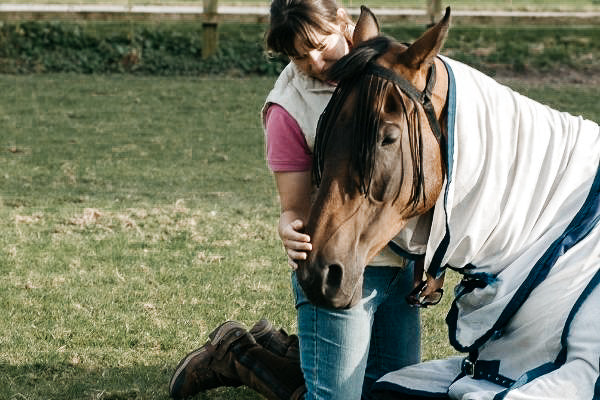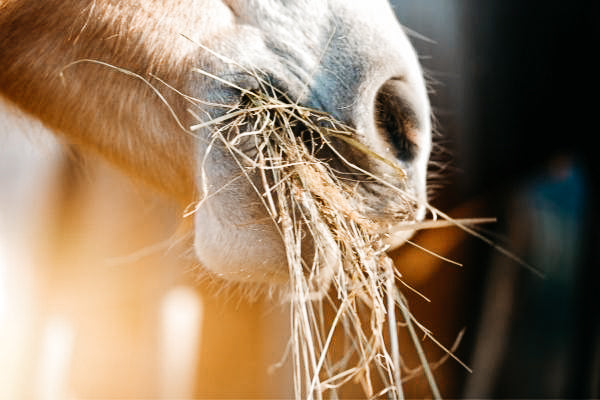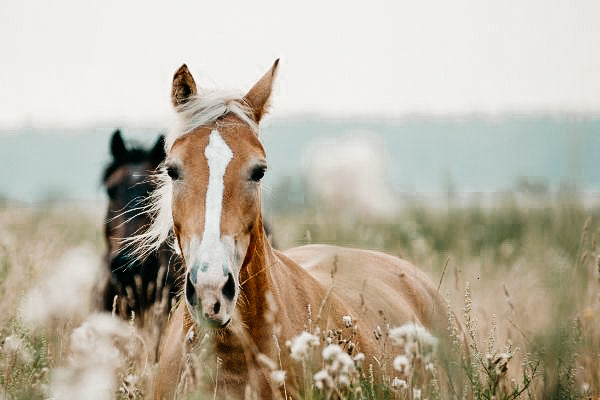
Stomach ulcers in horses
Introduction
The training of a horse is important - owner or Trainers observe the animal very closely. But horses often suffer from stress (e.g.b. through requirements, training sessions, transport, etc.a) Consequences of the disease without the symptoms being correctly interpreted: If you notice that the horse grinds its teeth, is bad or... If you eat picky food, suffer from “expulsion” and bad breath, stomach ulcers (ulcerations, technically “Equine Gastric Ulcer Syndrome” EGUS) can be the cause. This evil often goes unrecognized: studies show that up to 90% of thoroughbred racing horses, 60 to 80% of harness racing horses, 60% of competition horses and 37% of leisure horses are affected by stomach ulcers. Half of suckling foals are also affected. University-Prof. Dr. Heidrun Gehlen (Dipl. ECEIM, specialist equine veterinarian) confirms: “Gastric ulcers in horses are widespread. However, they often remain unrecognized because they can appear clinically unspecific or the symptoms are not interpreted correctly.“This is particularly dangerous because many animals often fall ill in silence. Dr. Ulrike Binding, equine veterinarian from Leichlingen, confirms: “Many animals don’t even show that they are suffering from stomach ulcers.“

The horse's stomach is quite small and, unlike humans, stomach acid is produced in it around the clock from the second day of life onwards. This originally made sense because the horse, as a steppe animal, was created to pluck forage all day long and eat steppe grass rich in raw fiber. This means that you should constantly chew and salivate, which provides bicarbonate as a buffer from the saliva. The acid-buffering saliva is only released when chewing or produced during suckling. Two-thirds of the stomach wall is lined with glands, one third consists of more sensitive, gland-free mucous membrane. The stomach lining is still very thin, especially in suckling foals. What is crucial for a healthy stomach is the balance between sufficient acid production so that digestion can proceed undisturbed and, at the same time, the body's own protective mechanisms functioning sufficiently and sufficient consumption of acid through regular food intake. If there is an imbalance, very young to old horses can suffer from stomach irritations and even stomach ulcers, most often in the gland-free part: in 55 to 80% of horses depending on the type of use, in foals depending on age in up to 88% (newborns) and 50% (weaners).
Diverse symptoms of an illness
All horses can develop stomach ulcers; However, the symptoms are often non-specific and the symptom picture is diverse. A mere assessment of the severity of individual symptoms does not allow an assessment of the severity of the possible illness
Foals may show the following symptoms: recurring colic or frequent supine lying, interrupted drinking, excessive salivation and teeth grinding. Diarrhea and fever occur, as well as a shaggy, dull coat, an overall poor level of development and changes in the blood count.
Adult horses often show the following symptoms: They are unwilling to eat, eat poorly or are picky, or stop feeding completely and then lie down. Recurrent colic, teeth grinding, “flehmen” and yawning as well as “burping” and bad breath also occur. The result is weight loss, reduced performance and an overall poor general condition. Depressive behavior, restlessness and even aggressiveness can also occur.

Diagnosis: correctly diagnose stomach ulcers
If stomach ulcers are suspected, only the veterinarian can make the definitive diagnosis using gastroscopy, as there are currently no reliable laboratory tests or biochemical markers for this. This is done using a flexible endoscope camera that is pushed into the inside of the stomach and immediately makes the effects visible via video (from severity level 0 = intact mucous membrane to severity level 4 = widespread lesions with deep stomach ulcers). Prof. Dr. Gehlen recommends that, in any case, after a gastroscopy and subsequent concrete findings, treatment should be targeted depending on the location and severity and the choice of medication, with individual preparations or combinations, as well as the length of therapy should be adapted accordingly.
If a gastroscopy is not possible, so-called diagnostic therapy usually helps: If the symptoms improve after the use of appropriate medication, ulcerations are likely the cause.
Stomach ulcers are factor diseases
Stomach ulcers rarely have just one trigger; rather, there are many factors involved. Stomach ulcers often occur in the glandular part when the ratio of the stomach's own protective mechanisms and acid buffers does not work properly. In the sensitive, gland-free part, (unnecessary) stress and the use of medication are often the cause. (Incorrect) feeding, illnesses, operations or (overwhelming) training also contribute to this.
Further information is available on helpful websites, e.g.b. under www.magengeschwuere-pferd.de, www.pferdewiki.de/wiki/Magengeschwür, www.barnboox.de/pferdewissen/gesundheit/krankheiten/gastritis-und-magengeschwuere-beim-pferd-oft-unerkannt/ u.a
Cause feeding error
In nature, horses eat fiber-rich food very slowly and for up to 18 hours a day, so their stomachs are almost never empty. The following feeding errors can lead to acidification of the stomach and promote ulceration: too much concentrated feed, too little roughage, feeding breaks that are too long, snares due to food envy and restlessness in the stable and poor feed quality. Roughage stays in the stomach for a short time between one and five hours, in contrast to grain and ready-made food. Leaving grain or finished food in the stomach for a long time can lead to fermentation, which can lead to stomach ulcers.
If there is too much grain in the feed, the starch is not fully digested in the small intestine. Some residual starch then enters the large intestine and shifts the balance of microorganisms, which leads to hyperacidity, as well as food deprivation and periods of hunger.
Stress makes you sick
In principle, horses can deal with acute stress well because, as flight animals, they urgently need stress as a survival mechanism in the wild. It becomes dangerous for the stomach with other types of stress, because just like with humans, the same saying applies to horses: too much stress makes you sick. A horse has basic needs that need to be satisfied: light, air, food, exercise and good social contacts. If there is an imbalance here, bad habits such as:b. Coping or restlessness/hecticness can result. Although stress in horses is difficult to measure, it has been shown that certain situations can promote the formation of stomach ulcers.
Pressure to perform, social stress (e.g.b. when re-stalling or weaning), strain on the horse's sensitive nerves, unpopular box neighbors, ranking battles or pain can cause stress, as can poorly fitting saddles and bridles.
Training can also be a cause
There is a direct connection between (exhausting) training and the occurrence
of stomach ulcers: the more intensive the training, the higher the likelihood of stomach ulcers. The trotting and galloping movements alone increase the pressure in the abdominal cavity and allow the acidic gastric juice to come into prolonged contact with the stomach wall.
Acute stress: illnesses, pain and operations
Horses with existing medical conditions have an increased risk of developing stomach ulcers. Surgery under general anesthesia and the administration of certain medications (e.g. b Phenylbutazone) can promote the occurrence of stomach ulcers. Last but not least, colic, illnesses and operations as well as pain mean acute stress. Around 80% of colic patients presented in clinics e.g.b. suffer from stomach ulcers.
Medication of choice: Omeprazole
EGUS is easy to treat. There are two approaches: administering medication to release stomach acid and administering food supplements to accompany therapy.
The drug of choice is omeprazole, a proton pump blocker that very effectively reduces the release of stomach acid into the stomach. In this way, the cause is eliminated and healing can begin. Omeprazole is approved in a special paste formulation for the horse, which can easily be administered by the owner once per day into the animal's mouth. Only omeprazole has been proven to have sufficient effectiveness and the required safety for use in horses, so that work can continue with the horse during therapy.
As a dietary supplement, e.g.b. one with a patented pectin-lecithin-glycerin complex is available. This has three effects: it counteracts hyperacidity and stabilizes the natural acid balance, inhibits the reflux of bile acids and the protective mucous membrane of the stomach is strengthened.

Once stomach ulcers have developed, they need a few weeks to heal completely. In times of unavoidable stress and strain, prophylactic administration of omeprazole is therefore useful.
Prevent stomach ulcers
Stomach ulcers can be avoided. Sensible prevention through adapted feeding, stress reduction and adequate training as well as support for stomach health are important measures for keeping horses healthy. The best feeding cannot prevent stomach ulcers if the environment is not right. Also Prof. Dr. Gehlen emphasizes: “Management in feeding and husbandry is the most important prophylaxis. Stress factors should be avoided if possible. If stress is unavoidable, the administration of omeprazole can be helpful as prevention.“The focus is on good feed quality, adapted feed rations and measures for the horses’ sensitive psyche.
Discover more posts

Every horse owner only wants the best for their beloved horse. Of course, this also applies when it comes to horse feeding. Horse feeding in particular is a complex topic that the horse owner ...
Continue reading
Help, my horse has a problem! In the autumn and winter months, horse owners can often discover manifestations of the horse disease “mud” in their horse's fetlock. Mauke is an inflame...
Continue reading
